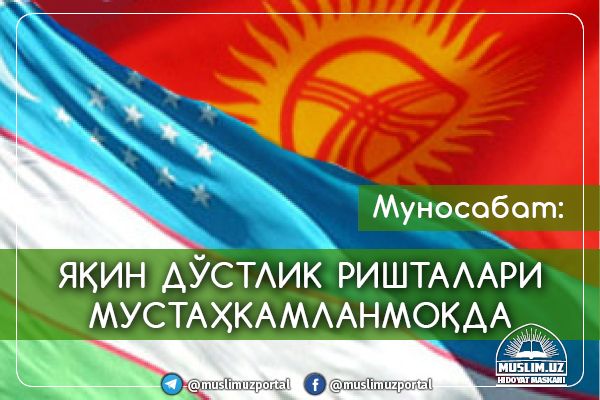Tashkent city



Uzbek and Kyrgyz people have been living shoulder to shoulder for centuries. The root of these nations is the same. They lived in peace by exchanging in marriages.
Two great writers and state figures Chingiz Aytmatov and Sharof Rashidov were close friends.
After acquiring independence, Uzbekistan and Kyrgyzstan established diplomatic relations. In 1992 Kyrgyzstan opened its embassy, while Uzbekistan opened its embassy in Bishkek in 1998. In 1996 two countries signed “Agreement on Eternal Friendship” which became legal basis for the relationship for two countries. 181 official documents had been signed until 2005.
But the issue of using trans-border rivers has lately caused misunderstanding between two countries.
Nowadays these two countries which have missed previous ties are renovating their relationships now. Sooranbay Jeenbekov, President of Kyrgyzstan paid an official visit to Uzbekistan.
“Kyrgyzstan is our close neighbor. That’s why there should not be any border between us. We opened our hearts to each other and for this reason we need to solve any issue”, said President of Uzbekistan.
In its turn, Sooronbay Jeenbekov expressed deep gratitude to Shavkat for the invitation and on behalf of people conveyed deep respect. President of Kyrgyzstan highly evaluated the efforts of Shavkat Mirziyoyev by saying: “You have turned our borders into real friendship, good neighborhood and partnership borders.”
Uzbekistan’s foreign policy highlights the importance of development successful relationships with neighbors. It has lately been observed an active integration process among Central Asian countries. Particularly, relations with Kyrgyzstan are leveling up. Visits between governmental bodies are widening.
During the meeting President Jeenbekov stressed his support for the President Mirziyoyev’s initiative for organizing constant advisory meetings with Central Asian leaders.
It is meaningful here to mention the participation of Maksatbek Toktomeshov, Muftiy of Kyrgyzstan at the International Scientific-practical conference called “Islamic solidarity in the example of Uzbekistan and Azerbaijan” which was hosted by Uzbekistan in Tashkent on October 18th of the current year. Muftiy of Kyrgyzstan Maksatbek Toktomeshov:
The visit of President of Kyrgyzstan to Uzbekistan will bring our relationships into new level. For this reason people of both countries are observing with great positive hopes.
Press service,
Muslim Board of Uzbekistan

The Tashkent Islamic Institute, named after Imam Bukhari, has organized a four-week professional internship for its 2nd-year students, running from January 26 to February 21.
Students are currently undergoing their practical training in various departments of the Muslim Board of Uzbekistan, including Education, Quran and Tajweed, Mosques, International Relations, Library, Women’s Affairs, and the Press Service. Additionally, internships are being conducted at the Fatwa Center, the "Vaqf" Charitable Public Fund, and other affiliated organizations.
Press Service of the Muslim Board of Uzbekistan